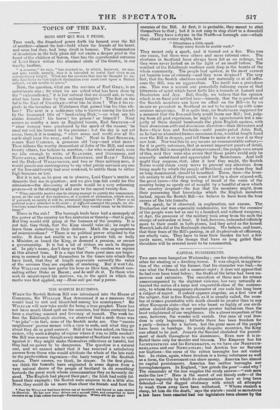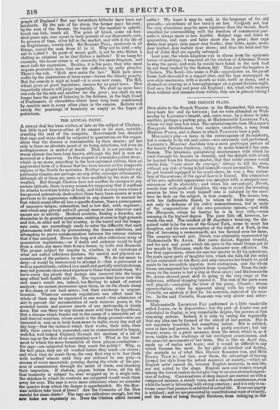CAPITAL PUNISHMENTS.
Two men were hanged on Wednesday ; one for sheep-stealing, the other for stealing in a dwelling-house. It was alleged, in aggrava- tion of the crime of the former, that his character was bad,—he was what the French call a nzauvais sujet ; it does not appear that he had ever been tried before; the thefts of the latter had been nu- merous and extensive. The execution of these men for crimes unacccompanied by the slightest violence, has very naturally at- tracted the notice of a large and respectable class of the commu- nity, to whom the sanguinary character of our code has long been a subject of regret. It indeed appears singular, on a first view of the subject, that in free England, as it is usually called, the num- ber of crimes punishable with death should be greater than in any other European state—that we who boast so highly of our civili- zation should display in our practice greater barbarism than the least enlightened of our neighbours. On a closer inspection of the case, however, the wonder will vanish. Our race of real free- dom is only beginning; hitherto there has been freedom for a party—licence for a faction, but the great mass of the people have been in bondage. In purely despotic countries, the King can afford to be just. JOSEPH the Second abolished the punish- ment of death throughout his dominions. Even now it is in- flicted there only for murder and treason. The Emperor has his LICHTENSTEINS and his ESTERHAZYS, es we have our NORTHUM- BERLANDS and our NEWCASTLES ; but Austria has no Sarums nor Gattons--the curse of the rotten boroughs has not visited her. In states, again, where freedom is a living substance as well as a form, the Government can show mercy. America has almost no capital punishments. America has neither boroughs nor boroughmongers. In England, "law grinds the poor"—and why? The remainder of the line supplies the ready answer—" rich men make the law !" Here is the secret of our bloody code—of the perverse ingenuity by which its abominations have so long been defended—of the dogged obstinacy with which all attempts to wash them away have been withstood. " Whoso stealeth a sheep, let him die the death," says the statute: could so monstrous a law have been enacted had our legislators been chosen by the of Parliament, of absurdities which have long been condemned by sensible men in every other place in the empire. Reform will THE FRENCH PLAYS.



























 Previous page
Previous page